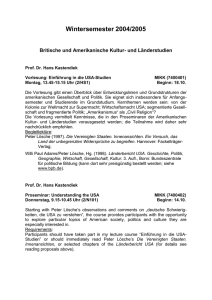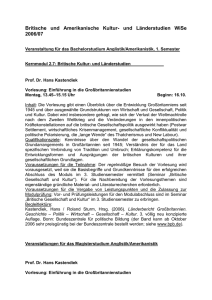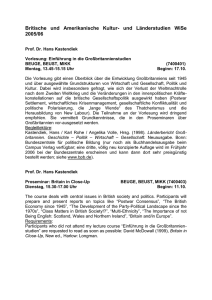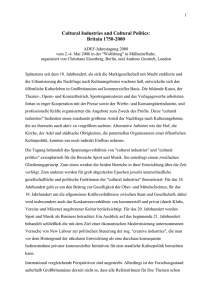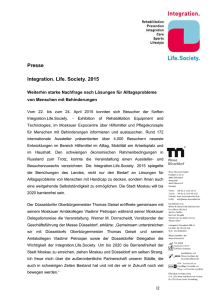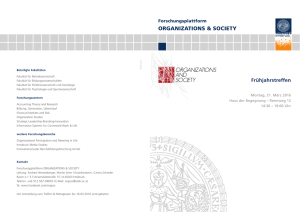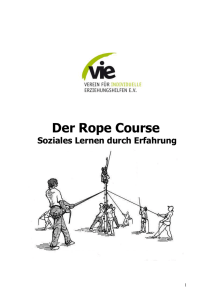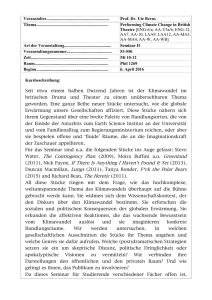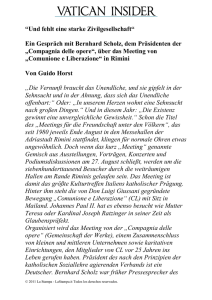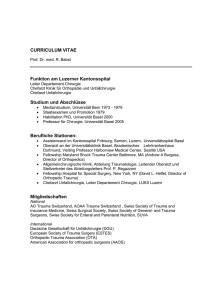Britische und Amerikanische Kultur
Werbung
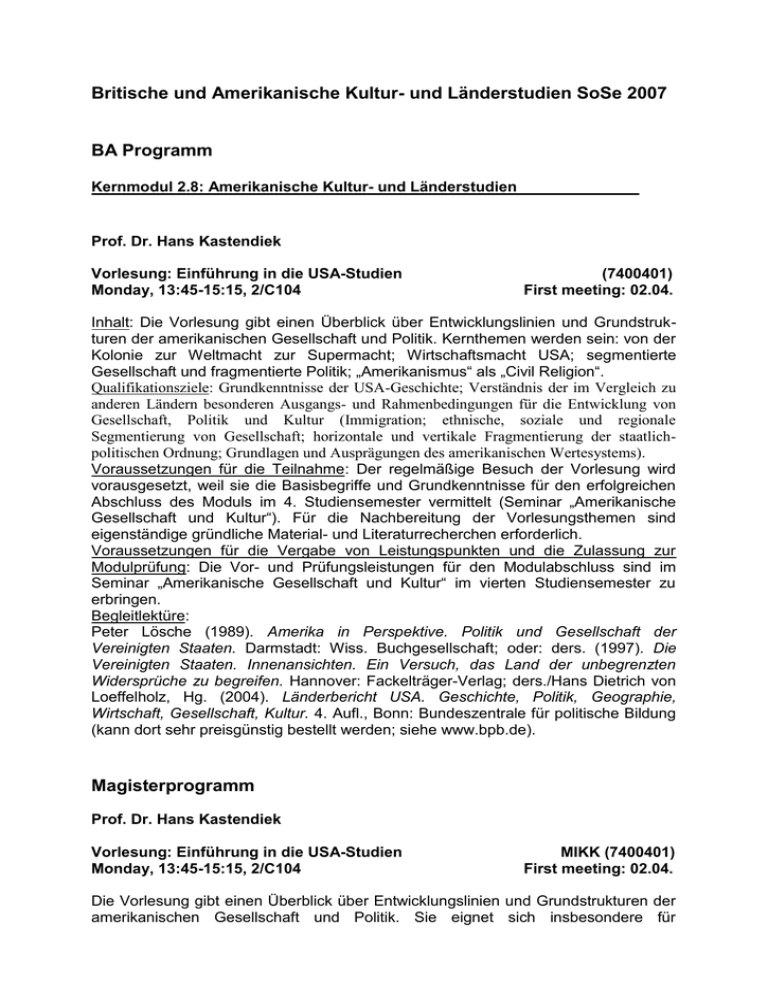
Britische und Amerikanische Kultur- und Länderstudien SoSe 2007 BA Programm Kernmodul 2.8: Amerikanische Kultur- und Länderstudien Prof. Dr. Hans Kastendiek Vorlesung: Einführung in die USA-Studien Monday, 13:45-15:15, 2/C104 (7400401) First meeting: 02.04. Inhalt: Die Vorlesung gibt einen Überblick über Entwicklungslinien und Grundstrukturen der amerikanischen Gesellschaft und Politik. Kernthemen werden sein: von der Kolonie zur Weltmacht zur Supermacht; Wirtschaftsmacht USA; segmentierte Gesellschaft und fragmentierte Politik; „Amerikanismus“ als „Civil Religion“. Qualifikationsziele: Grundkenntnisse der USA-Geschichte; Verständnis der im Vergleich zu anderen Ländern besonderen Ausgangs- und Rahmenbedingungen für die Entwicklung von Gesellschaft, Politik und Kultur (Immigration; ethnische, soziale und regionale Segmentierung von Gesellschaft; horizontale und vertikale Fragmentierung der staatlichpolitischen Ordnung; Grundlagen und Ausprägungen des amerikanischen Wertesystems). Voraussetzungen für die Teilnahme: Der regelmäßige Besuch der Vorlesung wird vorausgesetzt, weil sie die Basisbegriffe und Grundkenntnisse für den erfolgreichen Abschluss des Moduls im 4. Studiensemester vermittelt (Seminar „Amerikanische Gesellschaft und Kultur“). Für die Nachbereitung der Vorlesungsthemen sind eigenständige gründliche Material- und Literaturrecherchen erforderlich. Voraussetzungen für die Vergabe von Leistungspunkten und die Zulassung zur Modulprüfung: Die Vor- und Prüfungsleistungen für den Modulabschluss sind im Seminar „Amerikanische Gesellschaft und Kultur“ im vierten Studiensemester zu erbringen. Begleitlektüre: Peter Lösche (1989). Amerika in Perspektive. Politik und Gesellschaft der Vereinigten Staaten. Darmstadt: Wiss. Buchgesellschaft; oder: ders. (1997). Die Vereinigten Staaten. Innenansichten. Ein Versuch, das Land der unbegrenzten Widersprüche zu begreifen. Hannover: Fackelträger-Verlag; ders./Hans Dietrich von Loeffelholz, Hg. (2004). Länderbericht USA. Geschichte, Politik, Geographie, Wirtschaft, Gesellschaft, Kultur. 4. Aufl., Bonn: Bundeszentrale für politische Bildung (kann dort sehr preisgünstig bestellt werden; siehe www.bpb.de). Magisterprogramm Prof. Dr. Hans Kastendiek Vorlesung: Einführung in die USA-Studien Monday, 13:45-15:15, 2/C104 MIKK (7400401) First meeting: 02.04. Die Vorlesung gibt einen Überblick über Entwicklungslinien und Grundstrukturen der amerikanischen Gesellschaft und Politik. Sie eignet sich insbesondere für Anfangssemester und Studierende im Grundstudium. Kernthemen werden sein: von der Kolonie zur Weltmacht zur Supermacht; Wirtschaftsmacht USA; segmentierte Gesellschaft und fragmentierte Politik; „Amerikanismus“ als „Civil Religion“. Die Vorlesung vermittelt Kenntnisse, die in den Seminaren der Amerikanischen Kultur- und Länderstudien vorausgesetzt werden; die Teilnahme wird daher sehr nachdrücklich empfohlen. Begleitlektüre: Peter Lösche (1989). Amerika in Perspektive. Politik und Gesellschaft der Vereinigten Staaten. Darmstadt: Wiss. Buchgesellschaft; oder ders. (1997). Die Vereinigten Staaten. Innenansichten. Ein Versuch, das Land der unbegrenzten Widersprüche zu begreifen. Hannover: Fackelträger-Verlag; ders./Hans Dietrich von Loeffelholz, Hg. (2004). Länderbericht USA. Geschichte, Politik, Geographie, Wirtschaft, Gesellschaft, Kultur. 4. Aufl., Bonn: Bundeszentrale für politische Bildung (kann dort sehr preisgünstig bestellt werden; siehe www.bpb.de). Prof. Dr. Hans Kastendiek Proseminar: Understanding the USA Tuesday, 15:30-17:00, 2/NK003 MIKK (7400402) First meeting: 03.04. Starting with Peter Lösche’s observations and comments on “deutsche Schwierigkeiten, die USA zu verstehen”, the course provides participants with the opportunity to deal with particular topics of American society, politics and culture they are especially interested in. Requirements: Participants who did not attend my lecture course “Einführung in die USA-Studien” are requested to read as soon as possible: Peter Lösche (1989). Amerika in Perspektive. Politik und Gesellschaft der Vereinigten Staaten. Darmstadt: Wiss. Buchgesellschaft; or Peter Lösche (1997). Die Vereinigten Staaten. Innenansichten. Ein Versuch, das Land der unbegrenzten Widersprüche zu begreifen. Hannover: Fackelträger-Verlag. Susan Nitzsche, MA Proseminar: Politics and Society in Ireland Tuesday, 9:15-10:45, 2/SR40 BEUST, BEUGE, MIKK (7400403) First meeting: 03.04. The course, offered as an introduction to contemporary Ireland, aims at exploring a wide range of topics. As indicated in its title, one of our concerns will be to become familiar with basic patterns and structures of the Irish political system as well as with Ireland's external relations. Participants are invited to present topics like "The System of Government", "Parties and Elections", "Ireland and Europe", "Anglo-Irish Relations" or "Northern Ireland". The dramatic economic and social transformation of the Republic during the last decades offers numerous issues for further analysis such as "The Celtic Tiger", "Religion and Secularisation", "Women in Irish Society" or "Ireland as an Immigration Country". The proposals above do not represent a closed list. Rather, students are encouraged to suggest further issues they are especially interested in. Recommended reading: John Coakley, Michael Gallagher, eds. (2005). Politics in the Republic of Ireland. 4th edition, London: Routledge. William Crotty, David E. Schmitt, eds. (1998). Ireland and the Politics of Change. London: Longman. Dr. Sebastian Berg Proseminar: Britain: a Cultural Studies Approach BEUST, BEUGE, MIKK Thursday, 9:15-10:45, 3/A111 (7400404) First meeting: 05.04. Cultural Studies is an interdisciplinary effort to come to terms with the complex interplay of social relations and their cultural representations in a society. Starting out from Raymond Williams’s (who was one of the founding fathers of Cultural Studies) claim that “culture is ordinary”, it tries to find out how people make sense of their lives not only in aesthetic production but also in popular discourse and everyday situations. In this course, focusing on Britain, we will discuss the methodological approaches of Cultural Studies, distinguishing, for example, its cultural materialist from its poststructuralist versions, and then “do” Cultural Studies – i.e. apply these approaches to topical developments in British society. For a Schein, you are invited to make a contribution to the theoretical part or to prepare a case study. Introductory Reading: Roger Bromley (1999). “Cultural Studies gestern und heute” in: Roger Bromley, Udo Göttlich, Carsten Winter, eds. Cultural Studies. Grundlagentexte zur Einführung. Lüneburg: zu Klampen, 9-24. A master copy will be available at the archive of Kulturund Länderstudien and at Ms. Zenner’s office (rooms 39/216 and 39/226) by 15 March. Jens Rempel, MA Proseminar: Australia – A Sporting Nation? Friday, 9:15-10:45, RH 39/233 MIKK (7400405) First meeting: 13.04. “Australian society is racist. It also worships sport. What happens when these two values intersect?” (Tatz Aborigines in Sport: 4) Its is not only after the Olympic Games in Sydney in the year 2000 that sport has become a defining element in Australian national identity. This course’s intention is not to focus too much on the Australian Open, the Melbourne Cup horse race, Australian Rules Football and the like. We shall rather use sport as a vehicle to examine certain aspects of Australian society such as gender relations, the position of Indigenous people in the wider Australian society, the impact of globalisation on Australia, the role and structure of mass media, regional differences shaping the continent’s society, immigration and ethnicity as integral part of Australian history, sport as one major field of tourism and economics, the construction of Australian national identity, education and politics - just to name a few... Students shall attend classes on a regular basis. Schein requirements are an inclass-presentation and the submission of a term paper at the end of semester. Recommended reading: Bader, Rudolf, ed. (2002). Australien. Eine interdisziplinäre Einführung. Trier: Wissenschaftlicher Verlag Trier. Houlihan, Barrie (1997). Sport, Policy and Politics: a Comparative Analysis. London: Routledge. Prof. Dr. Hans Kastendiek Hauptseminar: What Went Wrong? Britain in the 1960s and 1970s BEUST, BEUGE, MIKK (7400406) Tuesday, 11:30-13:00, 2/D301 First meeting: 03.04. During the election campaign of 1959, Prime Minister Harold Macmillan claimed that the British people – as a result of Conservative policies since 1951 – ”never had it so good“. In her election campaign of 1979, after twenty years shaped by economic crisis and social conflict, Mrs Thatcher maintained that all British governments since 1945, including those of her own party, had contributed to Britain’s economic decline and stagnant society. Taking these two statements as a starting point, the course will explore why the 1960s and 1970s can be seen as an especially crucial period in British postwar history. A parallel class is offered by Dr. Berg: “The Troubled Years: the USA in the 1960s and 1970s”. Apart from the heuristic value of comparative analyses, taking part in both seminars will improve your understanding of the period under consideration. Recommended reading: Hans Kastendiek/Richard Stinshoff, Kontinuität und Umbruch. Zur Entwicklung Großbritanniens seit 1945, in: H. Kastendiek/Roland Sturm, Hg. (2006), Länderbericht Großbritannien. Geschichte, Politik, Wirtschaft, Gesellschaft, Kultur. 3. akt. und neu bearbeitete Auflage. Bonn: Bundeszentrale für politische Bildung (kann dort sehr preisgünstig bestellt werden; siehe www.bpb.de). Dr. Sebastian Berg Hauptseminar: The Troubled Years. The USA in the 1960s and 1970s BEUST, MIKK (7400407) Friday, 9:15-10:45, 2/SR40 First meeting: 20.04. When the newly elected president John F. Kennedy delivered his inaugural speech in 1961, the majority of Americans were optimistic about their country’s future, expecting an era of prosperity, technological progress, innovative government, and solutions to pressing problems such as the civil rights issue. When Ronald Reagan became president in 1981, many people worried about the future, were deeply suspicious about federal government, debated the USA’s economic decline, and felt unsure about the country’s future role in the world. In between lay two tumultuous decades of liberation and social unrest, welfare state expansion and war, a proliferation of non-conformist life-styles and moral outrage, governmental activity and misbehaviour. The aim of this course is to analyse in detail developments and changes during these two decades, to ask about their interrelations, and to reflect on their lasting effects. Those of you with a specific interest in this period might gain further insights by taking part in Prof. Kastendiek’s class “What Went Wrong? Britain in the 1960s and 1970s”. Important: Since the course will commence in the third week of term, you should collect and study the course overview before the first meeting. Copies will be available at the archive of Kultur- und Länderstudien and at Ms. Zenner’s office (rooms 39/216 and 39/226) by 15 March. Introductory Reading: For a short overview you should have a look into the relevant chapter(s) in one of the many textbooks on U.S. history, for example, Maldwyn A. Jones: The Limits of Liberty. American History 1607-1992. Oxford UP 1995, chapters 27 + 28, 543-595. A master copy will be available at the archive of Kultur- und Länderstudien and at Ms. Zenner’s office (rooms 39/216 and 39/226) by 15 March. Prof. Dr. Hans Kastendiek Examenskolloquium: Studienschwerpunkt Kultur- und Länderstudien (7400408) Thursday, 9:15-10:45, 2/SR15 First meeting: 05.04. Die Veranstaltung richtet sich an StudentInnen im Hauptstudium, die die Britischen und Amerikanischen Kultur- und Länderstudien als Studienschwerpunkt gewählt und das Abschlussexamen ins Auge gefasst haben oder bereits „mitten drin“ sind. Sie versteht sich nicht als ein „Examenskolloquium“ im Sinne eines „Repetitoriums“ zentraler Inhalte des Studiums zur Vorbereitung auf die Klausuren und die mündlichen Prüfungen. Vielmehr soll es um eine Verständigung über den Studienund Prüfungsschwerpunkt Kultur- und Länderstudien und nicht zuletzt auch um ganz praktische Fragen der Abschlussprüfung gehen: Strategien der Themenwahl für die Magisterarbeit; von der ersten Themenidee zur Themenvergabe; von der zentralen Problem- und Fragestellung zum Untersuchungsplan; zum richtigen Lesen; vom Lesen zum Schreiben; zum Umgang mit Arbeitskrisen; technische Fragen zur Magisterarbeit (Belegtechnik, Bibliographie, Layout etc.); „Lebensabschnitt Magisterarbeit?“ (Berichte von AbsolventInnen).
